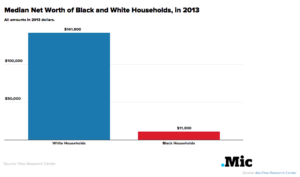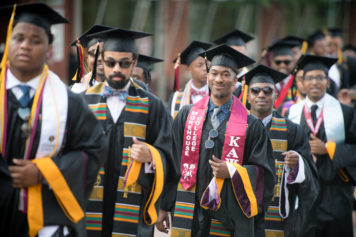
Black students typically have to take out more loans to complete their higher education and are offered lowered salaries even when they have the same educational backgrounds as their white counterparts.
It all paints a bleak image for Black college students and, unfortunately, a new study has failed to offer any positive updates.
It was widely believed that income differences were the major divider when it came to how much student loan debt a student was left with after graduating, but data obtained by Mic from the National Center for Education Statistics is finding that the disparity is not a rift in poor and rich — it is, indeed, an issue that’s Black and white.
Black students are far more likely to have more student debt than their white counterparts across all socioeconomic levels.
“In all, 32.5% of white bachelor’s degree recipients in the United States graduated debt-free, while only 15.8% of black students could say the same,” Mic’s Jon Levine reported. “Additionally, 25.4% of white students and 43.1% of black students graduated with debt greater than $30,500….Breaking down the numbers even further, at every income bracket, the percentage of black students with student loans was higher than that of white student loan recipients.”
And the gap is no minor difference.
In the income bracket of $30,000 to $59,000, a little more than 60 percent of white students had student loan debt while 80 percent of their Black counterparts in the same bracket had student loan debt.
For those in the wealthier income bracket of $100,000 or more, the gap was even larger with a difference of more than 20 percentage points between Black students in debt and white students in debt.
The statistics also revealed that the number of Black students in debt has increased from 2007-2008 to 2011-2012 across all income levels except for independents.

“Wealth matters in a family’s ability to pay for college,” Bergeron told Mic.
He added that without years of wealth accumulation in his own family, sending his own daughter to college may have been little more than a distant dream.
But since the focus on racial disparities has been largely focused on income rather than wealth, few people are aware of just how massive the wealth gap is between Black and white citizens.
While the median net worth for white households in 2013 soared beyond the $140,000 mark, the median net worth of Black households remained at a shockingly low $11,000, according to the Pew Research Center.
That gap, combined with the racial disparities in obtaining an education, is exactly why Bergeron says true equality in America hasn’t been seen.
“We have used expected higher education as a social equalizer in the United States,” he added. “If there are gaps by race or ethnicity … then it can’t fulfill that mission.”


